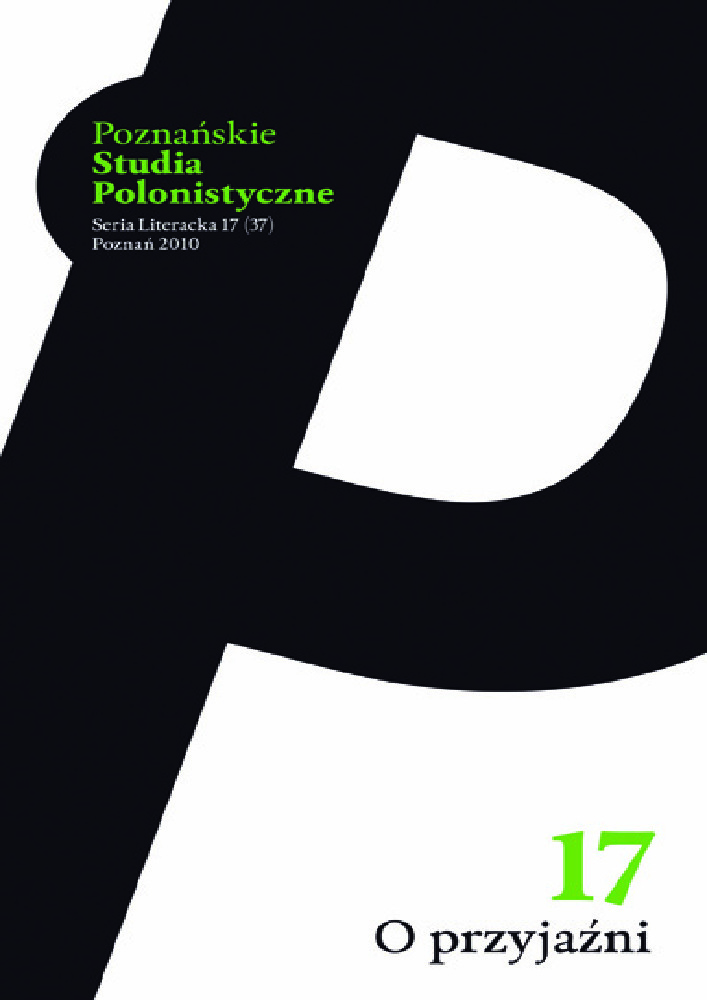Abstrakt
In her essay, the author recalls literary contexts (including John Donne, Michel Houellebecq and Ernest Hemingway) and philosophical and anthropological contexts (including Aristotle, Thomas Merton, Maurice Blanchot, Jean-Paul Sartre and Gilles Deleuze) presenting the poetic “I’s” various ways of approaching friendship. The quotation from a German translation of John Donne’s poem used in the title of the article is in itself a meaningful phonetic wordplay: “Kein Mensch ist ein Ich-Land” (no man is an “I” land, no man is an island). The main part of the essay includes an interpretation of the television series Lost — Joanna Roszak investigates philosophical references in the series and indicates biblical contexts (“Am I my brother’s keeper?”). A very apt comment to many episodes in the series is, according to the author, the formula told by Z. Herbert’s Fortinbras: Ani nam witać się ani żegnać żyjemy na archipelagach/ A ta woda te słowa cóż mogą cóż mogą” [It is not for us to greet each other or bid farewell we live on archipelagos/ and that water these words what can they do what can they do prince]. It is a similar defencelessness in which the main characters of Lost try to struggle the reality, even if they live together, and die all alone. Collective memory has become a safeguard for the community in the world, which is to be destined for homelessness and forlornness. The other person though becomes a reference point — it is him or her that makes it possible to find the way home.
Bibliografia
Bettelheim B., Cudowne i pożyteczne. O znaczeniach i wartościach baśni, przeł. D. Danek, Warszawa 1996.
Blanchot M., Przyjaźń, przeł. P. Mościski, „Arterie” 2004, nr 1.
Cummings E.E., love is the place — miłość jest miejscem, w: 150 wierszy, wybór, przeł., wstęp S. Barańczak, Kraków 1994.
Deleuze G., Bartleby albo formuła, przeł. G. Jankowicz, w: H. Melville, Kopista Bartleby. Historia z Wall Street, przeł. A. Szostkiewicz, Warszawa 2009.
Deleuze G., Desert Islands and Other Texts 1953–1974, red. D. Lapoujade, przeł. M. Taormina, Los Angeles–New York 2004.
Derrida J., Polityka przyjaźni, przeł. T. Zarębski, „Odra” 2001, nr 7–8.
Hamilton C., Towards A Post-Secular Ethics, Sydney 2008.
Hemingway E., Komu bije dzwon, przeł. B. Zieliński, Warszawa 1987.
Herbert Z., Tren Fortynbrasa, w: Wybór wierszy, Warszawa 1983.
Houellebecq M., Możliwość wyspy, przeł. E. Wieleżyńska, Warszawa 2006.
Hudzik J.P., Niepewność realnego: o nowoczesnym życiu w świecie iluzji, w: Estetyka wirtualności, red. M. Ostrowicki, Kraków 2005.
Kołakowski L., 13 bajek z królestwa Lajlonii dla dużych i małych i inne, Warszawa 2007.
Lynch S., Philosophy and Friendship, Edinburgh 2005.
Merton T., Nikt nie jest samotną wyspą, przeł. M. Morstin-Górska, Poznań 1997.
Merton T., No Man Is an Island, Washington 2002.
Sławek T., U-bywać. Człowiek, świat, przyjaźń w twórczości Williama Blake’a, Katowice 2001.
Smith Pangle L., Aristotle and the philosophy of Friendship, New York 2003.
Szymborska W., Podziękowanie, w: Widok z ziarnkiem piasku, Poznań 1997.
Tabako T., Dwie samotności, „Odra” 2008, nr 5.
Licencja
Autorzy
Autorzy tekstów przyjętych do publikacji w czasopiśmie „Poznańskie Studia Polonistyczne. Seria Literacka” są zobowiązani do wypełnienia, podpisania i odesłania na adres redakcji umowy o udzielenie nieodpłatnej licencji do utworów, z zobowiązaniem do udzielania sublicencji CC.
Zgodnie z umową, autorzy tekstów opublikowanych w czasopiśmie „Poznańskie Studia Polonistyczne. Seria Literacka” udzielają Uniwersytetowi im. Adama Mickiewicza w Poznaniu niewyłącznej i nieodpłatnej licencji oraz zezwalają na użycie sublicencji Creative Commons Attribution-NoDerivatives 4.0 International (CC BY-ND 4.0).
Autorzy zachowują prawa do dalszego, swobodnego rozporządzania utworem.
Użytkownicy
Zainteresowani użytkownicy internetu uprawnieni są do korzystania z utworów opublikowanych od 2016 roku w „Poznańskich Studiach Polonistycznych. Serii Literackiej” pod następującymi warunkami:
- uznanie autorstwa – obowiązek podania wraz z rozpowszechnionym utworem, informacji, o autorstwie, tytule, źródle (odnośniki do oryginalnego utworu, DOI) oraz samej licencji;
- bez tworzenia utworów zależnych – utwór musi być zachowany w oryginalnej postaci, nie można bez zgody twórcy rozpowszechniać np. tłumaczeń, opracowań.
Do wszystkich tekstów opublikowanych przed 2016 r. prawa autorskie są zastrzeżone.
Inne
Uniwersytet im. Adama Mickiewicza w Poznaniu zachowuje prawo do czasopisma jako całości (układ, forma graficzna, tytuł, projekt okładki, logo itp.).
